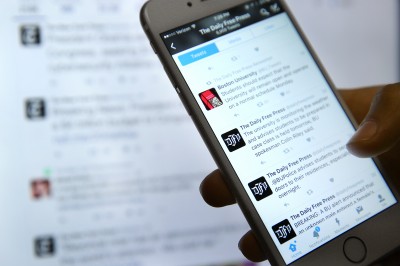
With the All-Star break upon the NHL, it’s time to discuss a topic that seemingly never lacks a supply of drama — professional journalists and Twitter. With the advent of Twitter, it’s possible to post your innermost thoughts for the whole world to see in 280 characters or less.
That can become very dangerous when holding a position of power, both literally and figuratively.
When learning about operating social media from the standpoint of a professional journalist, professors often tell students to avoid posting their opinions on issues, especially controversial ones.
Instead, professors will instruct students to post consistent, accurate information on whatever topic they are covering while having some kind of a personality that will resonate with readers enough to make them come back to your page or work.
But what determines the difference between a journalist posting an opinion that is part of the “Twitter personality” followers come back to and posting opinions that are frowned upon for being deemed problematic? And who decides these opinions are problematic?
On Jan. 4, Carolina Hurricanes beat reporter Sara Civian quote retweeted a news story about how a woman in a vegetative state was raped and gave birth. Her caption read “The male species disgusts me.”
Her tweet received 68 responses. Many responded with reactions similar to hers, wondering how an individual could do such a thing. Conversely, many others called her tweet sexist, and some even asked if her employers would approve of her tweeting it.
One person tweeted directly at the hockey section of her employer, The Athletic, asking them to fire Civian.
Sure, arguments can be made for and against her tweeting such an opinionated statement, but despite not knowing her personally, it can be assumed that she didn’t actually mean she hates every single man that ever has and will exist, as some claimed in an attempt to argue with her statement.
This just brings up a more important point in the world of Twitter and journalism: Where is this “line” journalists are accused of crossing, and who determines when it is crossed?
Here’s a broad fact: all journalists are people, too, and they all have opinions. Some choose to conceal their opinions more than others, but they still exist. Twitter has provided journalists with a platform to share more of their own opinions, and so it has become much more normal to see when scrolling through a timeline.
But readers and followers draw their own lines regarding what they believe a journalist should and shouldn’t say on Twitter when an opinion they read makes them uncomfortable.
That’s what makes the relationship between journalists and Twitter that much more complicated.
Each “line” that is drawn is based solely off of each individual follower’s beliefs. What a person believes one journalist can say may not be the same for another journalist he or she follows.
I don’t think I have ever seen someone tweet at a male NHL reporter stating that he doesn’t know anything about the sport and shouldn’t be talking about it because he’s a man, yet I have seen countless tweets of that nature directed at female reporters.
These loosely constructed lines can change in the matter of hours, whether prompted by outside factors or not.
Taking all of this into consideration, that then leads to another important question: What can be done about this, and should anything be done?
Sure, employers can prevent their journalists from posting any and all opinion, but with such restrictive rules, what’s the point in each reporter having his or her own personal Twitter account? This may also exclude freelance journalists who are not consistently contributing to one specific publication.
In a way, journalists sharing their opinions can be very important. People want to follow those that think similarly to them, and having someone that shares similar viewpoints no matter what the topic is can be an important tactic for expanding and maintaining a following.
At the same time, people love drama. Twitter is a hotbed for feuds and passionate opinion-tweeting, like the time Kanye West flooded timelines with a long stream of tweets. Drama, without a doubt, attracts attention.
Whether that’s good or bad attention depends on the situation, but it is still a good way to attract more eyes to your page. With The Athletic being only 3 years old, reporters that post opinions others may take issue with could be a different way for the sports news subscription site to increase its following.


















































































































